Belgium in the Eurovision Song Contest
| Belgium | |
|---|---|
.svg.png) | |
| Member station | VRT, RTBF |
| National selection events |
Internal Selection
National Final
|
| Participation summary | |
| Appearances | 60 (51 finals) |
| First appearance | 1956 |
| Best result | 1st: 1986 |
| Worst result |
Last: 1961, 1962, 1965, 1973, 1979, 1985, 1993, 2000 26th: SF 2007 Nul points: 1962, 1965 |
| External links | |
| Belgium's page at Eurovision.tv | |
|
Belgium in the Eurovision Song Contest 2018 | |
Belgium has participated in the Eurovision Song Contest 60 times since making its debut as one of the seven countries at the first contest in 1956. The only countries with more appearances are Germany (62), France (61) and the United Kingdom (61). Belgium have been absent only three times in total, in 1994, 1997 and 2001, due to low scores in the previous contests that relegated them from the contest. Belgium has won the contest once, in 1986.
In the first 20 years of the contest, Belgium's best result was Tonia's fourth place in 1966. In 1978, Jean Vallée achieved Belgium's first top three placement, when he was second. Sandra Kim became the first and to date only winner for Belgium in 1986, when she won as a 13-year-old in Bergen, performing the song "J'aime la Vie". Belgium's only other top three result came in 2003, when the group Urban Trad finished second in Riga, losing out by only two points. Belgium have finished last in the contest eight times, most recently in 2000, and have twice received "nul points"; in 1962 and 1965.
After the introduction of the semi-final round in 2004, Belgium failed to reach the final for five consecutive years (2005–09). Since 2010, Belgium have become more successful, qualifying for the final in five out of nine contests and placing in the top 10 four times, with Tom Dice sixth (2010), Loïc Nottet fourth (2015), Laura Tesoro tenth (2016), and Blanche fourth (2017).
History
Belgium has two national broadcasters of the contest, Flemish broadcaster Vlaamse Radio- en Televisieomroep (VRT) and French-speaking broadcaster Radio télévision belge de la communauté française (RTBF). The two broadcasters rotate selection for the Eurovision Song Contest each year (currently starting with 2002, VRT in the even-numbered years and RTBF in the odd-numbered years; until 1993 BRT/BRTN in the odd-numbered years and RTB/RTBF in the even-numbered years).
While VRT normally hosts a national final, Eurosong, when selecting their entries for Eurovision, it has been normal for RTBF to hold an internal selection process (although it has been known for RTBF to hold a national final at times, for example in 1998, 2005[1][2] and 2011, while VRT internally chose Tom Dice for the 2010 edition and Sennek for the 2018 edition).
20th century
Tonia's fourth-place at the 1966 contest remained Belgium's best result until Jean Vallée finished second in 1978. By 1980, Belgium had finished last in the contest five times, in 1961, 1962, 1965, 1973 and 1979.
Following good results for Stella (fourth in 1982) and Jacques Zegers (fifth in 1984), Belgium finished last for the sixth time in 1985. This was followed by Belgium's first (and only) Eurovision victory in 1986, when Sandra Kim won with her song "J'aime la vie" in Bergen, Norway. Although she claimed she was 15 years old, she was actually only 13, but was allowed to keep her victory. Currently the minimum age for participation is 16 and thus Sandra Kim will remain the youngest winner unless the age limit is lowered. By winning in 1986, Belgium became the last of the French-speaking countries to win the contest, as France, Luxembourg, Monaco and Switzerland all had won at least once before. Belgium scored an absolute record at the time, with Sandra Kim earning a never seen before amount of 176 points (that record remained until 1993, with Ireland scoring 187 points), an average of 9.26 points per voting nation. Kim received 77.2% of the maximum possible score, which, as of 2017, still ranks eighth among all Eurovision winners.
Belgium finished last for the seventh time at the 1993 contest, before achieving its only top ten result of the decade at the 1998 contest in Birmingham, where Mélanie Cohl finished sixth.
2000s
Belgium finished last in the contest for the eighth and (as of 2018) final time at the 2000 contest in Stockholm, before achieving its best result of the 21st century in 2003, where Urban Trad sang in an invented language and earned second place with 165 points, losing out to Turkey's Sertab Erener by just two points. Ishtar did the same in 2008, but finished 17th in the first semi-final, failing to qualify for the final. In the Eurovision Song Contest 2009, Belgium participated in the first semi-final on 12 May 2009, however they received just one point which came from Armenia and left them in second-last position.
2010–14
The 2010 entry for Belgium was Tom Dice, runner-up of the Belgian Flemish version of The X Factor in 2008. Dice was internally selected and announced by VRT on 25 November 2009.[3][4] Tom Dice finished 1st in the first semi-final, allowing Belgium to participate to the final for the first time since the introduction of the semi-finals. He eventually finished 6th, Belgium's best result since 2003, and along with 1959, the best result ever for a Flemish entrant, since Belgum's all top 5 placings have been achieved by the representantives of the French-language broadcaster RTBF.[5]
In 2011, the entry for Belgium was Witloof Bay. They didn't qualify for the finals, finishing 11th only one point behind Moldova, and thus 1 point behind the qualification.[6]
Due to the good results and the Flemish population's choice, the VRT cancelled 'Eurosong' selection procedure and chose internally for 2012. For the Eurovision Song Contest 2012, they choose 17-year-old singer Iris but decided to let the public choose what song she would sing to represent Belgium. However, she didn't qualify after finishing 17th of 18 entrants in the first semi-final, scoring just 16 points which was the second lowest total of all the 36 semi-final entrants.[7][8][9]
In 2013, Roberto Bellarosa, winner of The Voice Belgique, was chosen to represent Belgium for the Eurovision Song Contest 2013 in Malmö, Sweden. Bellarosa made it into the final and finished in 12th place.[10]
In 2014, VRT organized a national final again[11] and 30 participants were selected to enter the castings. Axel Hirsoux won the national final, with more than 50 percent of the televotes and four times (out of 7 international juries) the maximum of 12 points from the international juries. The song which represented Belgium was called 'Mother' and is a slow ballad.[12] The song failed to qualify for the final, finishing 14th out of 16.
2015–present
In 2015, RTBF chose another "The Voice Belgique" participant Loïc Nottet, who came second in 2014. He represented Belgium with his song Rhythm Inside in the first semi-final of the competition. He managed to qualify and came second with 149 points. In the final Loïc finished fourth with 217 points. It was the best result for Belgium since 2003 and it was the highest amount of points ever awarded to Belgium. It was also the first time ever that an entry who finished fourth scored over 200 points.
On 26 May 2015 VRT confirmed that it would use Eurosong again as the national final for the 2016 competition. This time the show only had 5 participants. Eurosong 2016 would span over 3 shows, but only in the last show could people vote for the entry who would represent Belgium at the Eurovision Song Contest 2016. On 17 January 2016 Laura Tesoro won Eurosong 2016 with her song What's the Pressure, co-written by Belgian singer Selah Sue. Other contenders were Tom Frantzis, Adil Aarab, Amaryllis Uitterlinden and Astrid Destuyver.
Laura Tesoro performed last at the second semi-final on 12 May 2016, and qualified for the final by finishing in third place on 274 points. In the final on 14 May 2016, she performed first and placed tenth on 181 points.
The Wallonian broadcaster RTBF announced on 22 November 2016 that Ellie Delvaux would represent Belgium in the 2017 contest under her stage name Blanche. Blanche had also appeared on "The Voice Belgique", like her predecessors Roberto Bellarosa (2013), Axel Hirsoux (2014) and Loïc Nottet (2015). It will be the fifth consecutive year that the Belgian representative was a former "The Voice" contestant, Laura Tesoro (2016) appeared on the Flemish version "The Voice van Vlaanderen".
On 8 March 2017, the song "City Lights" was officially announced as the Belgian entry for the Eurovision Song Contest 2017. It was leaked the night before, on 7 March 2017, through Spotify. Competing in the first half of the first semi-final on 9 May 2017, Blanche qualified for the final on 13 May and performed in the second half of the show, finishing in fourth place. Blanche's fourth-place finish gave Belgium its third top six result of the decade. The only other decade where Belgium achieved this, was the 1980s.
During the Eurovision weekend of 2017, Peter Van de Veire announced that VRT would internally select the participant for 2018. On 28 September 2017, VRT announced Laura Groeseneken as the Belgian entrant during the talk show Van Gils & gasten, aired on Één.[13][14] Although initially a favorite with bookmakers, "A Matter of Time" was the first Belgian entry since 2014 to not qualify for the final. She finished 12th with 91 points in the first semi-final.
Contestants
- Table key
- NOTES
- ^ The full results for the first contest in 1956 are unknown, only the winner was announced. The official Eurovision site lists all the other songs as being placed second.[15]
- ^ If a country had won the previous year, they did not have to compete in the semi-finals the following year. In addition from 2004-2007, the top ten countries who were not members of the big four did not have to compete in the semi-finals the following year. If, for example, Germany and France placed inside the top ten, the countries who placed 11th and 12th were advanced to the following year's grand final along with the rest of the top ten countries.
- ^ Spain originally gave its 12 points to Israel and 10 to Norway. After the broadcast it was announced that Spanish broadcaster wrongly tallied the votes and Germany should have got the top mark - 12 points - instead of being snubbed, as it happened. The mistake was corrected and so Germany was placed 7th over Norway. Israel and Norway both received 2 points less than originally and Croatia, Malta, Portugal, United Kingdom, Netherlands, Belgium, Estonia and Turkey all received one point less than indicated during the broadcast.
Voting history
As of 2018, Belgium's voting history is as follows:
|
| |||||||||||||||||||||||||||||||||||||||||||||||||||||||||||||||||||||||||||||||||||
Hostings
| Year | Location | Venue | Presenter |
|---|---|---|---|
| 1987 | Brussels | Centenary Palace | Viktor Lazlo |
Act selection process
| Year | Selection process | Broadcaster |
|---|---|---|
| 1956 | Internal selection | INR |
| 1957 | Artist: Internal selection Song: National final with 3 songs | NIR |
| 1958 | National final | INR |
| 1959 | National final with 2 participants | NIR |
| 1960 | National final with 5 participants | INR |
| 1961 | National final with 6 participants | BRT |
| 1962 | National final with 5 participants | RTB |
| 1963 | National final with 6 participants | BRT |
| 1964 | Internal selection | RTB |
| 1965 | Artist: Internal selection Song: National final with 6 songs | BRT |
| 1966 | Artist: Internal selection Song: National final with 4 songs | RTB |
| 1967 | National final with 7 participants | BRT |
| 1968 | National final with 10 participants | RTB |
| 1969 | Artist: Internal selection Song: National final with 6 songs | BRT |
| 1970 | National final with 4 participants | RTB |
| 1971 | National final with 12 participants | BRT |
| 1972 | Artist: Internal selection Song: National final with 10 songs | RTB |
| 1973 | National final with 10 participants | BRT |
| 1974 | Artist: Internal selection Song: National final with 6 songs | RTB |
| 1975 | National final with 10 participants | BRT |
| 1976 | National final with 5 participants | RTB |
| 1977 | National final with 3 participants | BRT |
| 1978 | National final with 8 participants | RTBF |
| 1979 | Artist: Internal selection Song: National final with 3 songs | BRT |
| 1980 | National final with 7 participants | RTBF |
| 1981 | National final with 10 participants | BRT |
| 1982 | National final with 4 participants | RTBF |
| 1983 | National final with 9 participants | BRT |
| 1984 | National final with 10 participants | RTBF |
| 1985 | Internal selection | BRT |
| 1986 | National final with 9 participants | RTBF |
| 1987 | National final with 11 participants | BRT |
| 1988 | National final with 12 participants | RTBF |
| 1989 | BRT | |
| 1990 | Internal selection | RTBF |
| 1991 | Artist: Internal selection Song: National final with 3 songs | BRTN |
| 1992 | National final with 10 participants | RTBF |
| 1993 | National final with 12 participants | BRTN |
| 1994 | Did not participate | |
| 1995 | National final with 10 participants | RTBF |
| 1996 | National final with 12 participants | BRTN |
| 1997 | Did not participate | |
| 1998 | National final with 10 participants | RTBF |
| 1999 | National final with 8 participants | VRT |
| 2000 | National final with 10 participants | RTBF |
| 2001 | Did not participate | |
| 2002 | National final with 7 participants | VRT |
| 2003 | Internal selection | RTBF |
| 2004 | National final with 7 participants | VRT |
| 2005 | National final with 2 participants | RTBF |
| 2006 | National final with 7 participants | VRT |
| 2007 | Internal selection | RTBF |
| 2008 | National final with 5 participants | VRT |
| 2009 | Internal selection | RTBF |
| 2010 | VRT | |
| 2011 | National final with 14 participants | RTBF |
| 2012 | Artist: Internal selection Song: National final with 2 songs | VRT |
| 2013 | Artist: Internal selection Song: National final with 3 songs | RTBF |
| 2014 | National final with 6 participants | VRT |
| 2015 | Internal selection | RTBF |
| 2016 | National final with 5 participants | VRT |
| 2017 | Internal selection | RTBF |
| 2018 | VRT | |
Commentators and spokespersons
Belgium has two broadcast stations VRT (Dutch speaking region) & RTBF (French speaking region). Both broadcast the event and over the years VRT and RTBF commentary has been provided by several experienced radio and television presenters, including Nand Baert, Jacques Mercier, Luc Appermont and Paule Herreman. However, since the 1991 Contest, André Vermeulen has provided the Dutch language commentary every year, with the exception of the 1996 Contest. Whilst Jean-Pierre Hautier has provided the French language commentary every year since the 1994 Contest. In 1962 VRT used the commentary from NOS (The Netherlands broadcast), the reason for that was unknown.
| Year(s) | Flemish Commentator | French-Speaking Commentator | Spokesperson | Dual Flemish Commentator | Dual French-Speaking Commentator |
|---|---|---|---|---|---|
| 1956 | Nand Baert | Janine Lambotte | N/A | No Dual Commentator | No Dual Commentator |
| 1957 | Nic Bal | Bert Leysen | |||
| 1958 | Arlette Vincent | Paule Herreman | |||
| 1959 | Paule Herreman | Bert Leysen | |||
| 1960 | Georges Désir | Arlette Vincent | |||
| 1961 | Robert Beauvais | Ward Bogaert | |||
| 1962 | Willem Duys | Nicole Védrès | Arlette Vincent | ||
| 1963 | Herman Verelst | Pierre Delhasse | Ward Bogaert | Denise Maes | |
| 1964 | Paule Herreman | André Hagon | No Dual Commentator | ||
| 1965 | Ward Bogaert | ||||
| 1966 | André Hagon | ||||
| 1967 | Janine Lambotte | Ward Bogaert | |||
| 1968 | André Hagon | ||||
| 1969 | Paule Herreman | Ward Bogaert | |||
| 1970 | Claude Delacroix | André Hagon | |||
| 1971 | Janine Lambotte | No spokesperson | |||
| 1972 | Arlette Vincent | ||||
| 1973 | Paule Herreman | ||||
| 1974 | Georges Désir | André Hagon | |||
| 1975 | Willem Duys | Paule Herreman | Ward Bogaert | ||
| 1976 | Luc Appermont | Georges Désir | André Hagon | ||
| 1977 | Paule Herreman | An Ploegaerts | |||
| 1978 | Claude Delacroix | André Hagon | |||
| 1979 | Paule Herreman | An Ploegaerts | |||
| 1980 | Jacques Mercier | Jacques Olivier | |||
| 1981 | Walter De Meyere | ||||
| 1982 | Jacques Olivier | ||||
| 1983 | An Ploegaerts | ||||
| 1984 | Jacques Olivier | ||||
| 1985 | An Ploegaerts | ||||
| 1986 | Patrick Duhamel | Jacques Olivier | |||
| 1987 | Claude Delacroix | An Ploegaerts | |||
| 1988 | Pierre Collard-Bovy | Jacques Olivier | |||
| 1989 | Jacques Mercier | An Ploegaerts | |||
| 1990 | Claude Delacroix | Jacques Olivier | |||
| 1991 | André Vermeulen | An Ploegaerts | |||
| 1992 | Jacques Olivier | ||||
| 1993 | An Ploegaerts | ||||
| 1994 | Jean-Pierre Hautier | Did not participate | |||
| 1995 | Marie-Françoise Renson "Soda" | ||||
| 1996 | Michel Follet | An Ploegaerts | Johan Verstreken | Sandra Kim | |
| 1997 | André Vermeulen | Did not participate | No Dual Commentator | No Dual Commentator | |
| 1998 | Marie-Hélène Vanderborght | Andrea Croonenberghs | |||
| 1999 | Sabine De Vos | Bart Peeters | |||
| 2000 | Thomas Van Hamme | Anja Daems | |||
| 2001 | Did not participate | ||||
| 2002 | Geena Lisa | Bart Peeters | |||
| 2003 | Corinne Boulangier | Anja Daems | |||
| 2004 | Martine Prenen | Bart Peeters | |||
| 2005 | Armelle Gysen | Anja Daems | |||
| 2006 | Yasmine | Bart Peeters | |||
| 2007 | Maureen Louys | Anja Daems | Jean-Louis Lahaye | ||
| 2008 | Sandrine Van Handenhoven | Bart Peeters | |||
| 2009 | Maureen Louys | Anja Daems | |||
| 2010 | Katja Retsin | Bart Peeters | |||
| 2011 | Maureen Louys | Sven Pichal | |||
| 2012 | Peter Van de Veire | ||||
| 2013 | Maureen Louys | Barbara Louys | Tom De Cock | ||
| 2014 | Peter Van de Veire | Angelique Vlieghe | Eva Daeleman | ||
| 2015 | Walid | ||||
| 2016 | Umesh Vangaver | No Dual Commentator | |||
| 2017 | Fanny Gillard | ||||
| 2018 | Danira Boukhriss Terkessidis | ||||
Additionly since 1998 VRT has supplied a dual commentator to join André Vermeulen, between 1999 and 2010 Dual commentary was provided by Bart Peeters and Anja Daems. Peeters provided the commentary during the years when VRT selected the entries whilst Daems commentated the years RTBF selected the entries. Since 2011 Sven Pichal has replaced Daems as commentator, whilts Peter Van de Veire has replaced Peeters. Since 2007 Jean-Louis Lahaye has joint Jean-Pierre Hautier as dual commentator for RTBF. After Hautier's death in 2012 Lahaye was joined by Maureen Louys in 2013.
Conductors
All conductors are Belgian except those marked with a flag.
- Léo Souris (1956)


- Francis Bay (1959, 1961, 1963, 1967, 1969, 1971, 1973, 1975, 1979)
- Henri Segers (1960, 1962, 1964, 1968, 1972)
- Gaston Nuyts (1965)

- Jack Say (1970, 1982)




- Giuseppe Marchese (1981)
- Freddy Sunder (1983, 1987, 1989)
- Jo Carlier (1984, 1986) (musical director in 1987)

- Daniel Willem (1988)
- Rony Brack (1990)
- Roland Verlooven (1991)
- Frank Fievez (1992)
- Bert Candries (1993)
- Alec Mansion (1995)
- Bob Porter (1996)
Prior to 1999, the Belgian entry was performed without orchestral accompaniment in 1980 and 1998.[16]
Photogallery
See also
- Belgium in the Eurovision Choir of the Year – A competition organised by the EBU for non-professional choirs.
- Belgium in the Junior Eurovision Song Contest – Junior version of the Eurovision Song Contest.
- Belgium in the Eurovision Young Dancers – A competition organised by the EBU for younger dancers aged between 16 and 21.
- Belgium in the Eurovision Young Musicians – A competition organised by the EBU for musicians aged 18 years and younger.
References
- ↑ "Belgian National Final 1998". Archived from the original on 22 October 2009. Retrieved 2009-04-04.
- ↑ "Belgian National Final 2005". Archived from the original on 22 October 2009. Retrieved 2009-04-04.
- ↑ Hondal, Victor (25 November 2009). "Tom Dice to represent Belgium in Oslo". ESCToday. Archived from the original on 28 November 2009. Retrieved 25 November 2009.
- ↑ "Tom Dice gaat naar het Eurovisiesongfestival" (in Dutch). VRT. 25 November 2009. Archived from the original on 29 November 2009. Retrieved 25 November 2009.
- ↑ "Eurovision 2010: complete televoting and jury results". wiwibloggs.com. 30 June 2010. Retrieved 23 March 2014.
- ↑ "Semi-final results at Eurovision 2011". wiwibloggs.com. 15 May 2011. Retrieved 23 March 2014.
- ↑ Sietse (2009-09-09). "Eén begraaft Eurosong als selectie voor het Songfestival" (in Dutch). VRT. Archived from the original on 2011-09-27.
- ↑ Sietse (2011-02-14). "No Euroson in 2012 but internal" (in Dutch).
- ↑ http://www.eurovision.tv/page/history/by-year/contest?event=1573
- ↑ Griper, Ann (19 May 2013). "Who are Eurovision Song Contest 2013 winners? Full results table". Mirror.co.uk. Retrieved 19 May 2013.
- ↑ "Belgium: VRT confirms participants for Eurosong 2014". wiwibloggs.com. 24 January 2014. Retrieved 23 March 2014.
- ↑ "Belgium: Axel Hirsoux wins Eurosong with 'Mother'". wiwibloggs.com. 16 March 2014. Retrieved 23 March 2014.
- ↑ Jiandani, Sanjay (28 September 2017). "Belgium: VRT will reveal the Belgian act for Eurovision 2018 tonight". Esctoday.com. Retrieved 28 September 2017.
- ↑ "Laura Groeseneken naar het Eurovisiesongfestival!" (in Dutch). VRT. 28 September 2017. Retrieved 28 September 2017.
- ↑ Barclay, Simon (June 17, 2010). The Complete and Independent Guide to the Eurovision Song Contest 2010. Silverthorn Press. p. 24. ISBN 978-1-4457-8415-1.
- ↑ http://andtheconductoris.eu/
External links
- Points to and from Belgium eurovisioncovers.co.uk
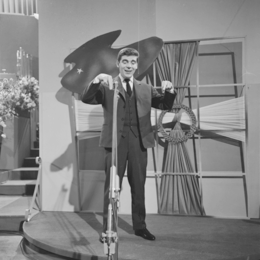
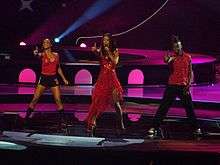
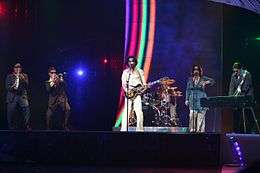
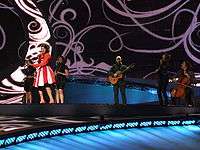

.jpg)
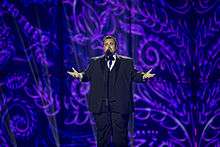
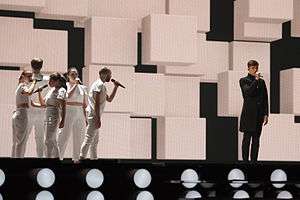
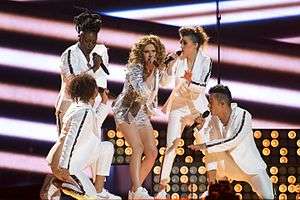
._Photo_380.jpg)
